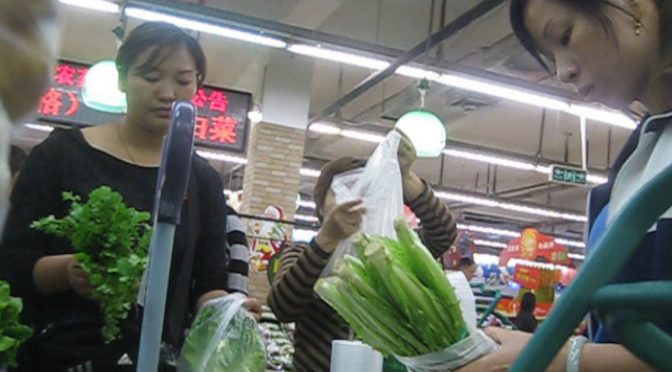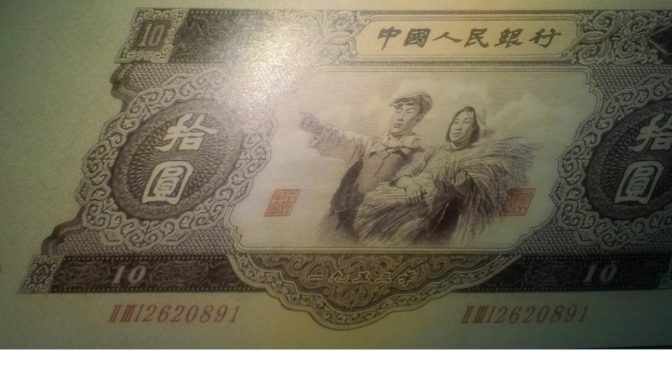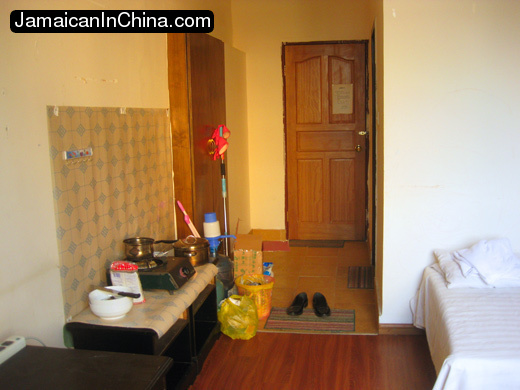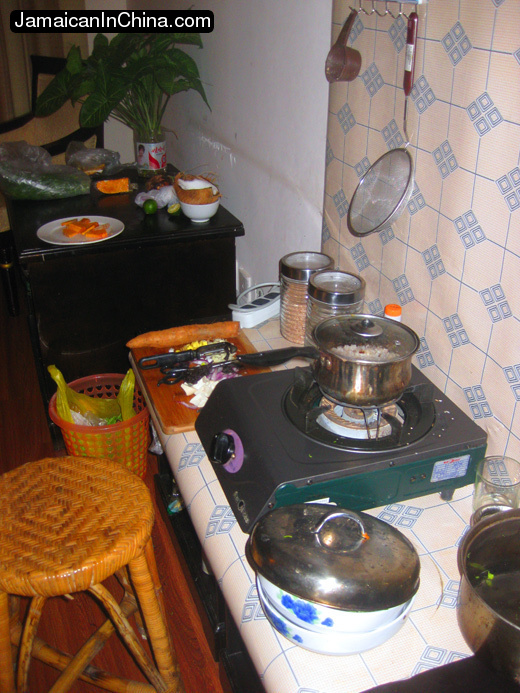All the produce in China is priced per 500g. So, when you see a sign announcing 2.20RMB for a papaya, it actually means 2.20RMB/500g, or 4.40RMB/kg. Now, then, I’ve figured out why they do that–it’s to confuse the tourists! No, really. I can prove it.
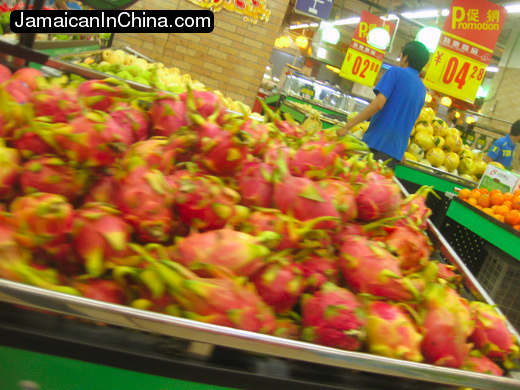
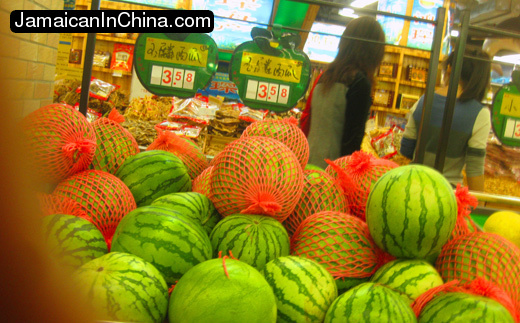
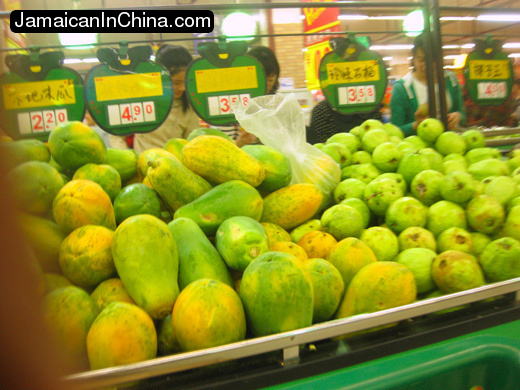
Most tourists, say an American (or a Jamaican who used to live in New York), thinks in terms of pounds. 1kg is actually 2 lbs, so when I see 2.20RMB, I think it’s 2.20RMB per pound, but it’s not. That’s confusing enough, but here’s where the trick comes in. The street vendors who sell produce use an entirely different system of computing prices. It’s called “free market, mood-based opportunity capitalism.” In other words, they charge by the pound, gram, kilogram, weather, nationality of the purchaser, color of your shirt, or day of the week, it really could be anything, depending on mood of the seller.
In 2009, when I visited China for the first time, I walked into a shop in Shanghai–within about an hour of landing at the airport–to buy a small 250ml bottle of water and asked the price. Storekeeper told me 2RMB. Now I know enough to know it should be no more than 1RMB, or perhaps I was simply sensing intuitively that “the game” was on. I stepped out of the shop, called my translator in (at the time, I was traveling with Chun Yu Wang, author of Chicken Feathers and Garlic Skin,) and had her ask the price. She’s Chinese. Caught in the act, the owner shyly admitted to her it was 1.00RMB. We all laughed at his obvious, failed attempt to play and win the game.
On another day, in Wuxi, I walked into a store to get a bag of cashews (7.50 RMB) and a bag of dried fruit (12.00RMB) with prices plainly written on the items. The shop cashier/owner punched in the prices in a calculator (she didn’t use the scanner like she did the day before), turned the small screen toward me indicating that my bill was 30RMB. Ahem. Now, I may not speak Mandarin, lady, but I went to school to be a civil engineer. We covered basic addition. First day, even. Heck, I can even do that one in my head. I took the calculator, silently punched in the numbers myself, turned the small screen back toward her showing her I would be paying 19.50 RMB. She waved her hand in disdain, took the 20RMB bill, gave me my .50 RMB change–all this in a wordless exchange of calculator buttons, bills and screen displays.
You might have already read my tale of The Greedy Innkeeper In Xishuangbanna.
Here in Hainan, I went to buy some nesberries, (that’s what we call it in Jamaica) sapodilla in America. The street vendor put my three nesberries on the electronic scale, punched some mood-based numbers, and asked for 20RMB, I gave him 10RMB, he laughed. I took my fruit and walked out. Say it with me now, “Someone will pay it….it just won’t be me!”
Around the corner from the Lost Hostel here in Sanya, there’s a vendor selling fruit. Asking price for a small papaya? 20RMB. Now, I shop at the supermarket in the city centre, so I know that a small papaya costs about 5RMB. I laughed and walked away.
The next day, as I returned from shopping, I decided I wanted a mango. I knew about what it should cost from my supermarket shopping experience. So, I walked towards Mr. Papaya’s stand, and fortunately, at the same time, there was a Chinese woman also buying mangos. So, sensing my own opportunity, I pretended to browse a little longer, delaying my purchase, lingering for a bit to give the lady a chance to select her mangos and pay for them. Then, I watched the screen of the electronic scale carefully, and noted that Mr. Papaya punched in 17RMB/kg for her mangos. (A day or two before, he had entered 29 for my mangos.) So, now that he had her mangos on the scale and told her the price, I approached him at the scale.
He knew that I had seen the price per kilogram that he had punched in for her. I knew that HE knew that I saw the price per kilogram that he had punched in for her. So, perhaps to avoid embarrasment, he had no choice but to give me the mangos at the same price. I could be mistaken, but he didn’t seem happy, though. I paid 15RMB for my two mangos (about what I would pay at the supermarket). He gave me my fruits and said “goodbye,” (An unusual thing for him to say, actually. I’ve never had anyone tell me goodbye before. Guess he wanted me to say “goodbye,” too (in other words. leave!) before I discovered the Chinese prices for everything on his stand!
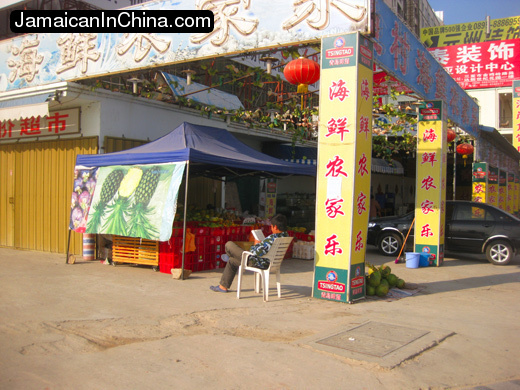
Would you buy a 20RMB papaya from this man? (Mr. Papaya)
I imagine that some people would have paid Mr. Papaya the 20RMB for various reasons:(1) to avoid a scene because they dislike confrontation, (2) Feeling ill-equipped to communicate effectively if there’s a language barrier, (3) It’s still cheap given the conversion rate to their native currency, and (4) perhaps other reasons I simply can’t relate to. However, there’s just something in me that won’t allow me to willingly pay for something when I know the price is being inflated simply out of what I perceive to be opportunism based on a stereotype of the unaware, easily-manipulated, easy-target foreigner.
It’s a way of business I’ve seen in many places–different prices for different customers. It’s done in the tourism business on Saipan. It’s done in Laos, and everyone who travels has likely experienced it to some degree. Business is about seizing the opportunity to get the most you can get at any and every given moment. The cost is variable and based not on any pre-determined intrinsic or objective value, but the ability and willingness (unwitting or otherwise) of the consumer to pay.
Now, maybe I’m being too forgiving, but I’ m not mad at the people who practice “opportunity marketing.” You know, In some ways, it’s no different from a hair stylist charging John Edwards $400 for a haircut. Yes, it’s a bit stressful for me, since I already hate shopping. But, I don’t want to impose an outsider’s standard of how business should be done. But, I’d like to hear what YOU think.
After he negotiated a good rate for my High Season Hainan Hotel room, my friend, Jian, emailed me the following:
“hey Walt,I read the news last night. People are complaining to the media that the whole tourist industry of Hainan is taking advantage of the Spring festival (Chinese New Year). The local Chinese government official commented: “This is normal.” (that is, no big deal. Don’t fuss.) Now you see why people say the Chinese capitalism is actually more real than the western one.
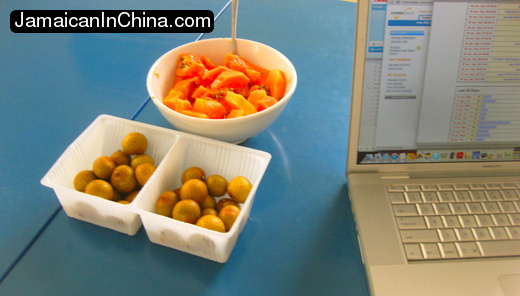
It occurs to me, as I enjoy my 5RMB supermarket-bought papaya here in Hainan, that my friend Jian is right!

